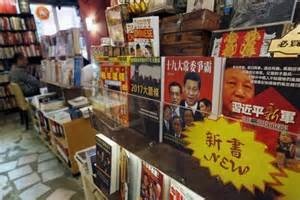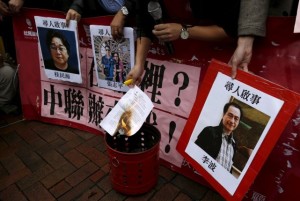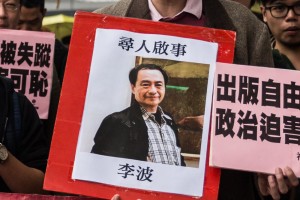
The Big Chill—Missing Hong Kong Publishers
January 24, 2016
 There’s a big chill moving through Hong Kong as publishers are reported missing. On October 7, last year, Gui Minhai went missing from his Thai resort house, his daily medications that he was sorting left on the table. That month, three of his colleagues —Lu Bo, Zhang Zhiping and Lui Rongyi— disappeared from Hong Kong. Lu Bo and Gui Minhai are co-owners and the others are employees of the Hong Kong based Mighty Current Publishing House notorious for producing salacious books about China’s top leadership—books long on lusty rumors and stories of corruption although short on sources. At the time of his disappearance, Mr. Gui was planning for a new book, The Pimps of the Chinese Communist Party.
There’s a big chill moving through Hong Kong as publishers are reported missing. On October 7, last year, Gui Minhai went missing from his Thai resort house, his daily medications that he was sorting left on the table. That month, three of his colleagues —Lu Bo, Zhang Zhiping and Lui Rongyi— disappeared from Hong Kong. Lu Bo and Gui Minhai are co-owners and the others are employees of the Hong Kong based Mighty Current Publishing House notorious for producing salacious books about China’s top leadership—books long on lusty rumors and stories of corruption although short on sources. At the time of his disappearance, Mr. Gui was planning for a new book, The Pimps of the Chinese Communist Party.
The books published by Mighty Current had survived in the lively Hong Kong book market for two decades while being banned in China. They were particularly popular with mainland day tourists visiting Hong Kong. Now their popular bookstore is closed and the press is shut. Like any troubling story there are complexities and mysteries.
On Dec. 30, Lee Bo, one of Gui’s business partners in the publishing company, suddenly disappeared as well. Lee and his wife owned the bookstore that sold their publications. Soon after disappearing Lee made a strange communication to his wife from Shenzhen that he was “working on an investigation.” His wife noted that he had left his passport at home. A passport he would need to enter Mainland China from Hong Kong. Lee Bo is a British citizen.
Last weekend, Sunday, Jan. 17, Gui, who is a naturalized Swedish citizen, suddenly showed up on CCTV —China’s official TV network—confessing tearfully that he had violated his probation back in China for a drunken driving accident in 2003 that had ended in a fatality. Hong Kong based China watchers were quick to point out the edits in the video as revealed by the fact that Gui‘s t-shirt changed color mid-way.
The immediate concern for citizens of Hong Kong is the brazen actions of Chinese mainland police who entered Hong Kong and arrested, kidnapped and removed detainees without warrants or accountability. The outcry from democratic activists has been loud and desperate. They fear that Hong Kong’s special “One country, Two systems” arrangement set up when the Brits left is unraveling quickly. These disappearances augur a dim future for Hong Kong’s special status and tradition of legal rights and freedom of the press.
I have been particularly interested in this story because it harks back to so many things I learned about free speech, the press and censorship when, in 1980, I went off to work as a “foreign expert” at Radio Beijing, China’s equivalent to Voice of America. China was opening to the West for the first time in three decades and 1980 was a pivotal moment of transition as the country was slowly recovering from the traumas of the Cultural Revolution and Deng Xiaoping was consolidating power to lead the nation in a new economic direction. I was a Deng Xiaoping hire.
As the first experienced broadcast journalist to work in the English department in Radio Beijing’s forty-year history, I was invited to teach classes in broadcast journalism and edit scripts. It was a year filled with frustrating experiences in the absence of journalistic ethics, free inquiry or any means to fact check combined with such mistrust that it was impossible to find Chinese officials or intellectuals or anybody willing to be interviewed. And the mistrust included suspicions about foreign journalists like myself. Most of the time I was treated as a spy despite being invited for my expertise in producing and reporting on radio.
I was also learning formidable lessons about the top down Chinese communication system. Documents about government policy were only available to top cadres in the Party in any workplace, special compilations of reprinted foreign news stories were only available to department leaders. Then at the bottom of the chain, the People’s Daily offered stories, criticism, bromides and instructions for the masses. It was a highly controlled channel of information under the direction of the Propaganda Committee of the Party. The Canadian journalist who first revealed this vertical privileged information system in the Toronto Globe & Mail in the late 70’s had to leave the country much as New York Times reporters have recently been expelled for writing stories about the wealth of the leading elites in the Party. During the past few years, other foreign reporters have been denied their permits to report in China when they write about taboo subjects or from a non-governmental perspective.
When I arrived in Beijing in 1980 the Democracy Wall Movement had just been suppressed. It was named after wall posters calling for all kinds of political and cultural reforms. Two years earlier, after the Cultural Revolution had been brought to a close by the arrest of the Gang of Four, this “free speech” movement by many former Red Guards—some of whom had once burned foreign books—called for more democracy. Unauthorized journals flourished—one called Beijing Spring—representing fresh hope among young people after the disastrous course of the Cultural Revolution. The New Democracy Movement was short lived. Wei Jingsheng, an eloquent voice of that movement, not only called for democratic reforms but when he pointed to Deng Xiaoping as a new tyrant he was arrested and sent to prison for many years. His trial transcripts —circulating while I was in Beijing—revealed his real crime was granting interviews to foreign journalists.
But that is ancient history. Publishing exploded along with the economic boom of the 90s and 00s. More and more foreign reporters work from China. An explosion of books by Chinese and foreign authors has deepened and broadened our understanding of twentieth century Chinese history and experience.
During my time in China in 1980-81, the shocking revelations about what had transpired during the Cultural Revolution was all new information to us Westerners. What started as a “free speech” big character poster movement in 1966 soon became a way to defame, humiliate and punish teachers, principles, Party cadres, and leaders. Abusive accusations on posters spiraled into hostile verbal and physical attacks. The resulting violence and withholding of medical care led in some instances to deaths and suicides. Anything foreign—especially books— was looted and burned. Forced confessions were a staple of shaming, humiliation and punishment during the Cultural Revolution. There was no legal system to speak of; law schools were just re-opening in 1980. That’s why the re-appearance of strange confessions on Chinese Television so disturbs China watchers and Hong Kong citizens. These confessions, in the absence of defense attorneys, contradict China’s insistence that they are pursuing the rule of law.
Censorship in the West and East has a long history, nearly as long as the history of communication. Socrates was forced to commit suicide in 399 B.C. for asking philosophical questions. A couple of centuries later, Chinese Emperor Qin Shi Huang ordered the burning of all books except on agriculture, medicine or prophecy. He wanted to protect the population from poetry, history and philosophy. His banned books even included some of Confucius’ work.
In the West the Catholic Church tried to ban books at the time of Luther and the Protestant Reformation. While the Enlightenment celebrated free speech and press, the twentieth century has witnessed a cornucopia of totalitarian control of speech, media, information and books, whether during the Soviet or Nazi era. Censorship was a key weapon under the Apartheid regime for almost five decades. In the U.S. “The Adventures of Huckleberry Finn” was a banned book in the 19th century then sexually explicit novels, like D.H. Lawrence’s “Lady Chatterley’s Lover,“ were either banned or heavily edited in much of the English speaking world during the first half of the twentieth century.
In the twenty-first century the greatest censorship project is China’s efforts to control the Internet. Reporters Without Borders, an NGO that studies press freedom throughout the word ranked China 176 among the 180 countries it analyzes in its most recent report.
Yet China’s constitution affords its citizens freedom of speech and press, while media regulation controlled by the Party contradicts those laws frustrating many Chinese reporters and editors. The government argument is always that they are preventing the leaking of “state secrets,” or information that endangers the country. That last phrase reveals that the real fear may be the loss of control by the Party. Whether it is the heavy booted effort to control the press and suppress free speech or the violation of a fair legal process in jailing human rights lawyers who defend journalists, bloggers, and women’s rights activists the Party leaders seem increasingly totalitarian. And the parading of victims on Chinese TV making emotional confessions rather than being dealt with in a court of law may indicate power struggles within the Chinese Communist Party.

In this picture taken on January 3, 2016, a protestor holds up a missing person notice for Lee Bo, 65, the latest of five Hong Kong booksellers from the same Mighty Current publishing house to go missing, as they walk towards China’s Liaison Office in Hong Kong. Britain confirmed on January 5 that one of five missing Hong Kong booksellers feared detained by Chinese authorities is a UK citizen, saying it was “deeply concerned” over the disappearances. AFP PHOTO / ANTHONY WALLACE / AFP / ANTHONY WALLACE (Photo credit should read ANTHONY WALLACE/AFP/Getty Images)
It all contributes to The Big Chill in Hong Kong. Last year Yuo Wentlian, another Hong Kong publisher was jailed for ten years while preparing a book on President Xi Jinping’s relationships with women. And the news of Jan. 22 reveals that yet another pro-democracy reporter, Li Xin, who defected from China last fall and had sought and failed to gain asylum in India, has just disappeared at the Laos, Thai border.
Gail Pellett’s book, Forbidden Fruit—1980 Beijing, a Memoir, will be published by Van Dam in February, 2016. Pellett is a writer, director, and producer of award-winning TV and radio documentaries. Her work has appeared on PBS, NPR, NBC, the Canadian Broadcasting Corporation, and Pacifica Radio. Her articles have appeared in the Washington Post Magazine, Mother Jones and the Village Voice, as well as in webzines—Truthout, Common Dreams, Moyers Media and the Pan-Asia Photography Review.
This op-ed was published in 3Quarks Daily on January 25, 2016
